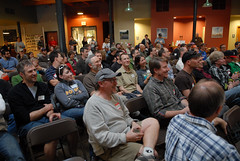
at kickoff event for Portland Trail Fest.
(Photos © J. Maus)
The kickoff of the first annual Portland Trail Fest last night served as an inspirational kick-in-the-pants for local off-road riding advocates.
It has been nearly three years since the lack of local trails was first brought to the attention of the City’s bicycle advisory committee. Chris Distefano, the man who made an impassioned speech to that committee on May 9, 2007, addressed the crowd last night. Distefano is the marketing director at Chris King Precision Components, a company that allows him paid time away from the office to advocate for more mountain biking in Portland. Before introducing the night’s speakers, Distefano — a former board member of the International Mountain Bicycle Assocation (IMBA) and PR guy for Shimano America — stated the ultimate dream for local mountain bikers:
“Pretty soon, we’ll be able to ride to where we ride.”
If Portlanders hope to ride quality singletrack without getting in their car to do it, Tom Archer will play a role in making it happen. Archer is president of the Northwest Trail Alliance, a non-profit group with a 20-year history in Portland that has completely remade itself in the last 12 months. In addition to a new name (they were formerly known as PUMP), Archer and his expanded board of directors have brought fresh faces, energy and professionalism to the group’s efforts. But those efforts, he warned last night, can’t continue unless more people step up with donations and membership. “We have more projects than we can manage with just volunteers.”
Wearing a cast on his arm to heal a broken wrist, Archer said jokingly, “I’ve been mixing it up with the Parks Bureau trying to get trails in Forest Park.” Archer is a member of the committee trying to hash out a package of recommendations for expanding bike access in Forest Park. That process has gotten mixed reviews from advocates and the meetings have gotten contentious in recent months.
Emily Roth, the Parks planner overseeing that process, was in attendance last night. In a sign of how effective Northwest Trail Alliance has been in cultivating productive relationships with Portland Parks staff, when Archer thanked Roth in his speech she received a rousing ovation from the crowd.
In part because of Archer and the new tact of his organization, International Mountain Bicycling Association executive director Mike Van Abel, said the Northwest Trail Alliance is “in the vanguard” of off-road advocacy groups nationwide. In his keynote speech, Van Abel said mountain bike advocates must shed the “no rules” spirit the sport was born from.
He showed a slide with a bumper sticker proclaiming; “Don’t be the Rangers’ bitch. Ride the illegal trails.” The sticker elicited a “Not in Forest Park!” cry from Parks’ Roth and Van Abel warned that while that sentiment might still exist among some riders, “It just doesn’t get you too far down the trail in terms of advocacy.”
Perhaps because of the complexity of managing shared-trails, Van Abel shared a few of their “model trail” projects like Valmont Bike Park in Colorado and the Allegrippis Trails in Pennsylvania. “Purpose-built” bike trails (meaning made for bikes only), Van Abel said, are a big focus of IMBA these days.
But here in Portland, our issue is how to co-exist on trails where hikers and runners are plentiful. Van Abel had some advice on that front. He shared a statement from a contact “high-up in the Forest Service” who told him, “Until you force the Forest Service to change, we won’t change. We’re hard-wired for the status-quo.”
That change is coming, Van Abel said, thanks to groups like the Northwest Trail Alliance.
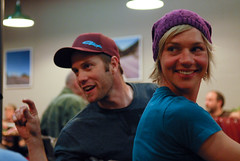
Kirt and Lindsey Voreis; passionate advocates from Bend.
|
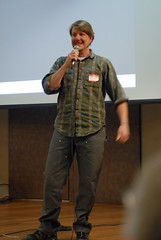
Woody Starr from COTA in Bend came to share their successes.
|
After his speech, I asked Van Abel if he had any words of wisdom for how local advocates might move forward on the Forest Park bike access issue. He said it will take “constant, reasonable pressure” on decision makers and that, “This is much bigger than, ‘We want our trails!’. Mountain biking is a way to get kids outside, to tackle obesity. It must be a popular appeal.”
The event last night was a fitting kickoff for the Trail Fest. It was equal parts inspiration and information. For more photos, check out the full gallery.
There’s a lot more coming as the Trail Fest continues through Sunday. Tonight, there’s a guided ride with Mr. Van Abel around the trails on Powell Butte followed by a food and socializing at Hopworks Brewery.
– See NW-Trail.org/trailfest for all the details.




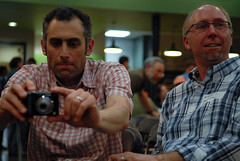
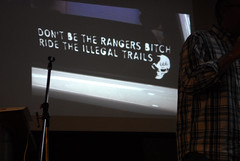



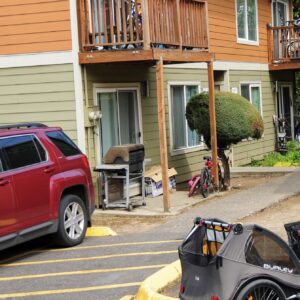
Thanks for reading.
BikePortland has served this community with independent community journalism since 2005. We rely on subscriptions from readers like you to survive. Your financial support is vital in keeping this valuable resource alive and well.
Please subscribe today to strengthen and expand our work.
great event. Looking forward to see the fruits of IMBA and NTA’s labors.
this is portland’s biggest cycling weakness. everyone should help out, from the zoo bombers, to the fixies, to the roadies.
i saw the imba trail crew subaru the other day off glisan, and felt like help has finally arrived.
Thank You to all who attended! Mr. Maus is correct, this was a pep rally for off-road opportunities. In the future, we hope to have victory celebrations!
Brian
I’m 75 mile a week bike commuter who reads this blog everyday. I love everything bike related about this city. It is my primary reason for moving here. I come from a city (Philadelphia, PA) were they went ahead with single track in the city parks. It ending up really ripping up the trails. People made their own trails. a lot of what the people are afraid of happening here happened there. It’s a bad Idea to have bike riding off road in this park. They should improve the fire roads and open up more access points and install bike racks at the trail heads.
Jason, I would suggest that you check out the Friend’s of Wissahickon’s website (FOW.org) for their Sustainable Trails Initiative, a joint project between FOW, Fairmont Parks and IMBA. The trails in Wissahickon were almost exclusively user generated or built for short term reasons other than recreation. Mountain bikes are now a big part of the solution and not the problem.
Great article, with one correction; Purpose built does not mean bikes only, just maximized for the Bike experience. Allegrippis is only open to bikes and foot traffic by Army Corps regulation at the site.
Frank Maguire
IMBA Regional Director, Mid Atlantic
Frank, I am familiar with the FOW, they are a great group. Ive done trail work with them. Your reading a website, I am telling you from years of first hand experience it just doesn’t work. Id be happy if a track was built just for bikes, like the skate parks here. They don’t belong in a place a special as forest park.
Jason,
Respectfully, Frank isn’t just reading the FOW website. IMBA has worked in Wissahickon Park with FOW and FPC for the past 6 years, and on an informal basis for the 7 years before that. Each year, our staff spend several months in the park assessing, designing, maintaining and building trails, and doing restoration projects. Last year, we worked exclusively restoring a hiking-only trail in the Park.
PMBA now exists and does monthly work parties in the Park as a result. User conflict with bikes started the conversation, but FOW quickly realized with objective analysis that their problems were far greater, and that their system design and management was facilitating the conflict.
But if you don’t take our word for it, as the leading professional bike trail consultants in the country, read the consultant’s report from 2004 (available on the FOW website): poor trail design, highly erodable soils, storm water management, deer overpopulation, off-leash dogs, invasive species, etc., all in a park which sees almost a million visitors a year.
Wissahickon Park is making it happen successfully in an arguably more challenging environment. We can offer sustainable, fun trail options for cyclists in Forest Park, while reducing user conflict and improving the experience for all park users and the long term health of the park.
-Jill Van Winkle
IMBA Trail Solutions
Jill, Thanks for the lengthy reply and info. all the challenges you mentioned about the Wissahickon are true, I don’t know if its fair to say that they’re making it work,It didn’t feel that way when I was there. but I have been away for 6 years now so maybe things have improved. I still feel like even the best intentions can go wrong when you have cyclist who just don’t care about the rules and are out for some (often ego fueled)off road adventure at the expense of our beautiful park. there is no money to have people paroling such a huge park to catch abuse. Even volunteer enforcement is not going to be enough. its a shame, I read the bikeportland,org blog everyday and love what they do, but this issue is keeping me from becoming a member. 🙁
Just for clarification, Jason: Becoming a member of what? IMBA, Northwest Trail Alliance? …or do you mean financially supporting BikePortland.org?
Jason,
You have been out of that area for 6 YEARS! Your comments are very appropriate for 2005. IMBA has worked extremely hard on this area and it is night and day from where it was 6 years ago.
Scott, Sorry I meant bikeportland.org. and Paul I acknowledge 6 years is a long time, I guess time will tell for forest park. Thanks to everyone who has taken the time to have this discussion with me
As stated above, there’s no such thing as a “bike only” trail. Pedestrians can legally be on any trail. Luckily, as most cyclists are also hikers.
“…but I have been away for 6 years now so maybe things have improved”
This pretty much says it all, yeah?
I find it telling when I hear things like cyclists “are out for some (often ego fueled)off road adventure.” Many people first raise sensible concerns, but as you address those with facts and solutions you get to something more telling: They don’t like bikes in nature on an aesthetic and emotional level, so much so that they even make judgements about our character and motivation. I try to relate by thinking about how I feel about snowmobiles and motorcycles in nature – that is how some see bikes.
It is beholden on us to show how we are not like motorized users – we are quiet, not smelling (well…), don’t damage trails or wildlife, do more trail work than any other users, etc. – but also to acknowledge that we change the feel and experience for some people, so we need to find ways to share places while minimizing those impacts (e.g., different times, different trails, good trail etiquette…)
It is beholden on them to work with us to find ways to allow people with different preferences to also enjoy public places.
Frank Selker
Frank…the reason people do not enthusiastically welcome bikes to, as you put it…’nature’….is because bikes are vehicles. Being vehicles, bikes don’t contribute positively to the nature experience people go to natural areas for, unless the people happen to be off-road bike enthusiasts.
The speed differential between bikes and people traveling on foot is probably one of the bigger contributors to unenthusiasm for bikes on shared single track. Bikes are invariably faster, meaning people on foot have to put up with the disturbance of being passed by bike traffic. Unless of course management were to go for the alternate day use some off-road bike advocates are suggesting.
There’s another way to deal with the speed differential problem: fixed gear, set up to enable a speed of say…6mph at 75-90 pedal rpm’s. Front and back brakes, of course. That’s almost twice as fast as people walking travel. Off-road bike riders might have to deal with runners passing them, but they shouldn’t mind in exchange for access to single width trail in the park.
Allow bikes set up this way, access to any trail in the park they choose, the same as all other park users. I’m mostly joking, of course, but that arrangement would certainly put people riding off-road bikes on a more equal basis with people traveling on foot, compared to the use of multi-geared bikes, which poses and inherent inequality between the two modes of travel.
It’s foolish suggest cyclists should all be installing new drivetrains on their bike just to ride forest park. A drivetrain that literally would render the bike useless to 99.99% of trail riders. Most people wouldn’t physically be able to power the bike on trails. You’re also prescribing bike upgradaes costing in the $100-$200 neighborhood or more, and requiring shop time to install…
It seems as though a lot of folks plugged into the cycling community are referencing reasonable and functioning precedent, then wsbob is presenting slighty outlandish and mildy insulting fantasy to troll for reaction.
If it really is just boils down to cyclists not being legitimate trails users in your eyes — than your argument for opposition starts to evaporate.
I just hiked up lower mcleay trail two days ago. There were off-leash dog trails everywhere. I think dogs should be much more rigidly enforced in efforts to clean up the park, the whole Metro area invited to visit and volunteer to pull invasives, and all legitimate trail users should be allowed access.
Yes f5…I direct you to the last paragraph of my comment #15:
“…I’m mostly joking, of course,…”. wsbob #15
Mostly…Joking… . But perhaps a sense of humor is something else you’re desperately lacking. Besides, having a sense of humor might mean you’d have to forgo your quixotic dismissal of people whose opinion you disagree with.
Actually, I’m not familiar enough with bike mechanicals to know for sure, but I thought about it some before I made the presenting the idea of low fixed gearing for shared single track. I’m pretty sure the combination I listed is very low, and that most reasonably conditioned cyclists could easily ride it on much of the single track in Forest Park. However, I’d certainly welcome an experienced bike builder’s opinion on this.
Trials bikes is kind of what I was thinking of.
Ever been on the trail when a group of UofP runners comes through? Those guys are hauling, and they don’t want their heart rates to slow, so they don’t yield the trail.
I, as a decent but not great female runner, can easily go 10 mph on the descents, with an average pace of ~8mph. Dogs dart down the trails considerably faster than runners or bicyclists. In general, I run slower on narrow, twisty trails than I do on Leif. The same is true for riding, but the slowing is more dramatic. Ride FL5 with bike computer and check your speed on the choked section near the intersection with Wildwood and on the singletrack at the bottom. Compare with speed at the top of the trail, where it’s on the wide, straight, road corridor.
On the trails, my average speed running is not that different than it is riding – a little faster up hill, a little slower down hill (when running, that is). The flow of the trail has a very similar feel for both activities: good “flow” is important, berms and rollers, grades that are not too steep, twists and undulations, some trail texture and obstacles. I approach, call out, and have to pass other trail users in a manner very similar to when I am riding.
I’m lucky- I both enjoy running and have the knees to tolerate it. This isn’t the case for most of my cycling friends. For now, I’ll stick with running in the park because the experience is so much more interesting and fun than it is for riding. I hope to have a compelling reason to ride in the park soon. Since I live a bit out on the east side, I probably won’t go to the park any more frequently, but there will be a key difference- I drive to run. I’ll ride to ride.
Jill, with all due respect comparing runners to bikers is silly. Bikers can seriously hurt you if they hit you, they tear up the trails and create illegal routes and obstacles. I’m sorry your friends don’t have the knees to run in forest park like you, but their recreation (biking) has no right to interfere with hikers, runners, wildlife habitat etc… Everyone has a right to enjoy forest park, but not if that recreation and enjoyment degrades the physical (trails) and mental experience. This notion that mountain bikers have some sort of “right” to be in this park is flat out wrong. I see this way of thinking to be selfish and flawed. I find it hard to believe that you guys really care about forest park. It seems like you care about having some adventure in a place that can not support it. Are there any other cyclist out there who agree with me?
Fixed-gear single speed bikes are on an order of magnitude greater difficulty to operate than geared bikes with a freewheel, regardless of gearing ratio. Most people have difficulty riding a fixed-gear on flat ground, let alone on trails. Without the benefit of a freewheel, constantly pedaling makes balancing in technical terrain (not smooth and flat) much more difficult and puts riders at much greater risk for accident and injury.
What’s the point? To be funny? What I think is funny are people that simply cannot fathom having to give an inch while expecting others to give them a mile.
Jason #19: That’s some pretty worn out Dogma my friend. The science simply doesn’t support your claims. Mountain Bikes right to trials is ‘flat out wrong’? Nick Fish would tell you, and his subordinate at the head of Portland Parks, otherwise.
Jill…physical disability such as weak knees is certainly one condition under which it seems reasonable to support access of off-road bikes to single track in a nature park such as Forest Park. Off-road biking would be basic transport under such a circumstance.
Other various derivations of off-road biking beyond this most basic, slow…as in no more than twice the speed of a person on foot…is something I personally don’t see to be a very wonderful addition to the experience I believe nature parks are being set aside to provide people with.
That’s just my opinion which has no bearing whatsoever on the issues and decisions before the Forest Park Advisory Committee, and Comm. Fish.
I’ll agree somewhat with Jason’s comment #19 on the ‘comparison’ aspect. Wouldn’t say the comparison is silly, but bikes are vehicles. Runners are on their own feet, just as walkers are, transporting themselves through the park entirely on their own energy. Their pace and presence on the trail is governed by that mode of transportation. When the legs stop moving, the runner stops.
Bikes are vehicles people use to avoid having to expend their own energy for every foot of distance they cover. Riders of most bikes…except fixed gear…Mr.f5…don’t have to move their legs to cover ground going downhill and to some extent on the flats if they’ve built up momentum enough to coast.
I was mostly joking about off-road fixed gear, but the more I think about it, I’m pretty certain it’s doable with very low gears that would put riders at a walkers pace or somewhat faster. Some of you reading may be aware that their are people that ride unicycles off-road (check out PBS). I got to think that would be much, much harder than riding a fixed low geared bike.
I refuse to be managed by anecdote. Research simply does not back up your claims regarding environmental impacts.
Alas, when we address environmental impacts, speed becomes the concern. If we address speed, the issue shifts to the mechanism?
Would you ban all types of mechanical or animal assistance?
Decades ago, it was pretty much people hiking on the trails. It got easier with fancy hiking shoes and gore-tex, then the running boom took off and trail runners came in droves, and people with their dogs, off-leash and on. GPS, cell phones, i-pods, marathon training runs, events,.. whose experience of the park is more valued? who decides?
Finally, we are only talking about a portion of the trails – the majority of the singletrack will still be pedestrian-only. If you don’t want to interact with a cyclist, for whatever reason, there are lots of trails to explore.
“Research simply does not back up your claims regarding environmental impacts”
Jill, that’s just not true about research, regardless how could you ignore the fact that Forest park is on ridge with tones of steep slopes in a city that gets rain 7 months out of the year. mountain bikes with nobbie tires will destroy a trail in those conditions. And there is no way anyone here can say that mountain bikers will avoid the single track when the soil is saturated with water.
Jason: Repeating something doesn’t make it so.
You are, again, wrong. Trail erosion and degradation is a result of improper trail design, and not bike tires. Trails erode because they don’t shed water, proper trailbuilding techniques accomplish this.
There are infinite sources that could be quoted, here is just one example of one that is user-impartial:
http://docs.google.com/viewer?a=v&q=cache:sd3nYxxa13YJ:www.dnr.state.wi.us/org/land/parks/trails/council/minutes/sustainabletrails.pdf+trail+design+shed+water&hl=en&gl=us&pid=bl&srcid=ADGEESg6zv0n37lRFTpyccVkSCbr9qzXhP-Y8SuxF0OnuXJnNwdEOJeV5B3qK5Bg-dL4v1hNC0R1WPJkCZ0wT5InHEbYSiRiOa-2m3jqk8K95W7g3PGkLmC76YeOl0uysrISjFzHm-ra&sig=AHIEtbQoBGk28DqVu5CnjberZDzXQEPeTA
“…Decades ago, it was pretty much people hiking on the trails. It got easier with fancy hiking shoes and gore-tex, then the running boom took off and trail runners came in droves, and people with their dogs, off-leash and on. GPS, cell phones, i-pods, marathon training runs, events,.. whose experience of the park is more valued? who decides?
Finally, we are only talking about a portion of the trails – the majority of the singletrack will still be pedestrian-only. …” Jill #23
Maybe not “…whose experience…”, but ‘what experience’, as in, what type of experience is it the park’s first priority to provide people with? And not just parts of it, but the whole 5000 acres.
If it’s simply ‘recreation’, that makes opening the door to off-road biking…and probably lots of other unconventional activities…easy.
If the parks’s first priority is to provide urban dwellers with a close-in accessible example of nature unsullied (a description which a number of off-road bike enthusiasts have contemptuously dismissed), then there’s good reason to question whether off-road biking belongs in Forest Park.
Off-road bike enthusiasts commenting to stories on bikeportland have produced numerous rationalizations as to why off-road bike riding should be permitted in Forest Park.
Park management itself seems ready to proceed with making more single width trail (single track), accessible to off-road bike enthusiasts.
It has decided that off-road bike enthusiasts are a legitimate user group. Sounds like a ‘done deal’ doesn’t it?
As you noted in your comment, the park was first and foremost a park where people got around by foot. Early on, everybody that walked there was probably considered a ‘hiker’ (a term some off-road bike enthusiasts commenting to bikeportland have of late, chosen to use in a derisive sense of meaning).
But fundamentally they were and are walkers, using their own two feet to get around the park.
If park management believes accurately that the people they serve are telling them the park no longer needs to be conserved in its entirety as a natural urban sanctuary, a refuge from the nutty commotion and destruction of nature brought about through creation of the city..then fine…by all means…if the people want vehicular recreation on single track in this natural area…let them have it.
It should be interesting to note how this all plays out a few years from now. For example, to find how much of the trails will become off-road biking accessible.
Jason-
Your anointment of Forest Park as some how “better” than or more “unique” than or more “sensitive” than other functional city parks across this country reveals your narrow minded “not in my current backyard” approach.
It also reveals your membership in “Portland is Holier” than other bike friendly cities, towns, regions or countries. Wrong again. Collaborate with cyclist, don’t attempt to obliterate mountain bikers, their needs and their trail systems.